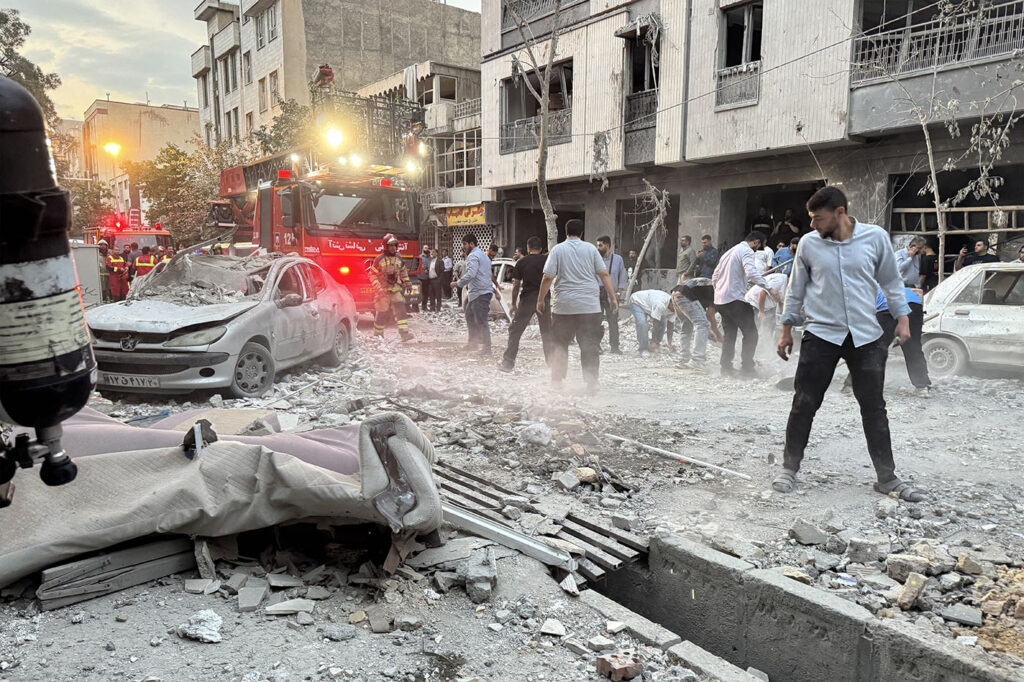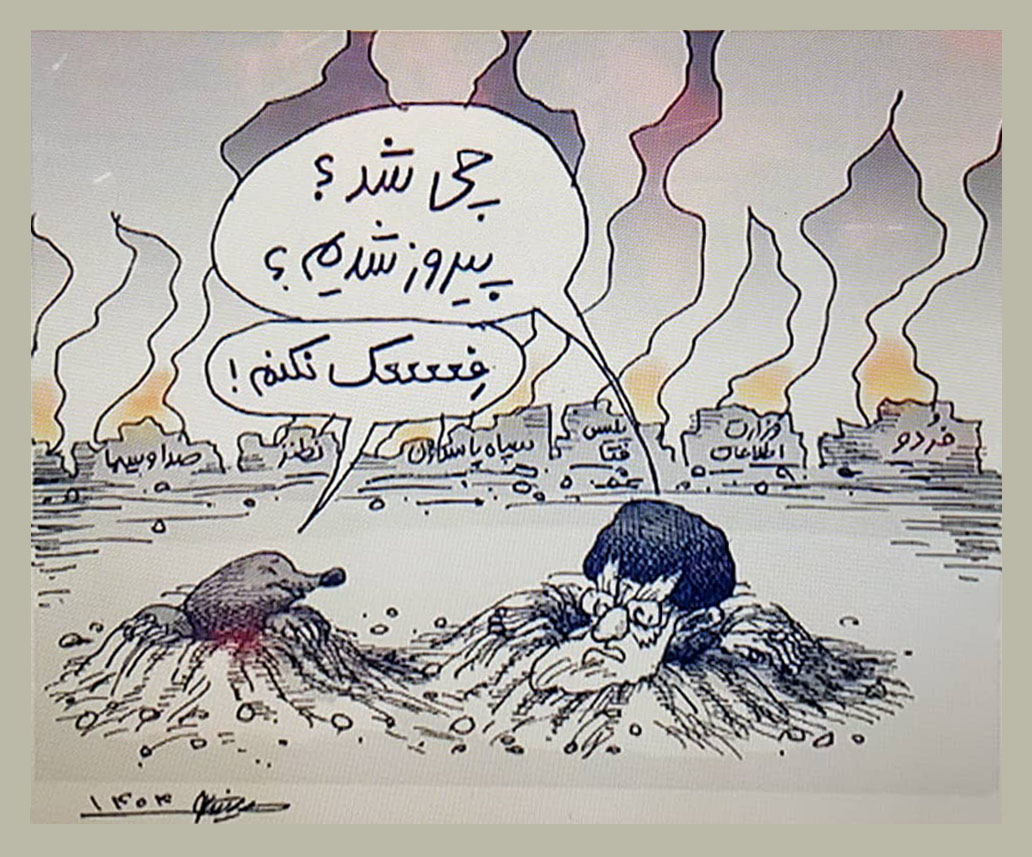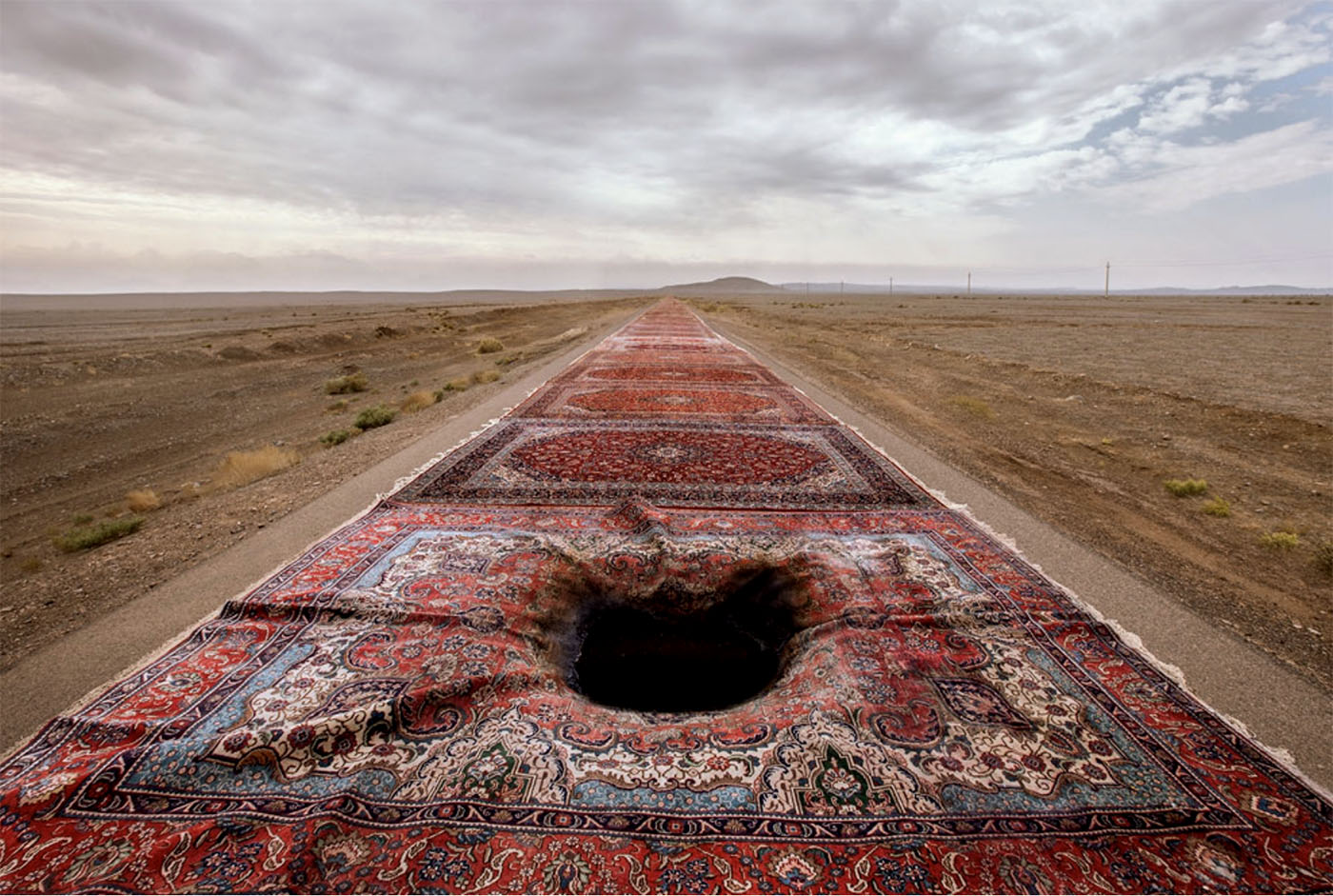Iranians pause to reflect and reassess after the intense bombing of the 12-day war, when basic goods like oil and rice disappeared from store shelves and bank accounts were hacked, leaving many without money. An older generation still believes in “patience and faith,” while a more pragmatic generation of Iranians, like Amir's, is caught between loving the culture and wanting real change in their country, pulled between polar opposites of wishing to stay and wanting to leave. Meanwhile the Islamic Republic takes out its failures and frustrations on the Iranian people, with arrests and executions.
It’s the morning after Iran and Israel announced a ceasefire.
As always, the anti-aircraft sirens sound tired and worn out, cutting through the night unexpectedly and pulling me, without thinking, out onto the balcony. My eyes follow the glowing trails across the sky. I spot a small bright dot far away. I wonder — maybe it’s a drone, or something trying to escape. I look more closely: no, it’s a star. Still, quiet, unmoved.
Maybe we’re the ones who have changed — not the star. Maybe that soldier firing at the sky also mistook a star for a drone. Or maybe none of us can tell the difference anymore.
These past 12 days have changed everything. We’re not the same people we were before. It’s like someone whose house has collapsed in an earthquake, now searching through the rubble for an old diary.
It was a war we still don’t know when exactly began or ended. And now we’ll carry it with us for the rest of our lives, always asking: Who are we? Why did we lose? Why does the government claim victory, after so many failures?
How can someone look into a mirror, maimed and bloody and still ask, “Did you see how well I hit them?”
On the first morning of the ceasefire, the newspaper headlines had changed. Just yesterday, one paper had boldly printed a photo of a missile with the words: “A decisive response is on the way.” Now it showed the image of an unveiled woman with the headline: “After the storm.”
And a peace no one really knows the shape of.
BBC Persian reported that Evin Prison was hit by an Israeli strike. The main entrance, the women’s ward, the visitation hall, the library — everything was damaged. One thousand two hundred male prisoners were transferred to the Greater Tehran Prison. They didn’t even have time to grab their clothes or bring their medication along. Seven hundred female prisoners were sent without basic supplies to the vastly inferior and more dangerous Qarchak prison in the unbearable heat. So much for the Israelis’ “symbolic” bombing that was supposed to free Iran’s political prisoners.

On social media, people wrote: “Now that the enemy is gone, it’s the people’s turn.”
Sources close to the Revolutionary Guard said at least 700 people were arrested during these 12 days for allegedly collaborating with Israel. Six were executed. Three of them, all Kurds, were hung in the northwestern city of Urmia near the Turkish border. They were Kurdish kolbars or porters who carry banned goods on their back across the mountains into Iran. The Norway based Iran Human Rights group said the porters had been initially charged with smuggling alcohol over the border but were forced to confess to espionage charges for Israel, even though one of them had been arrested as far back as 2016.
To cover up for the massive failure of the 12-day war, the government has already begun an internal crackdown, with the Revolutionary Guards and Basiji deployed to the borders and official warnings of “the danger from within,” notably the Kurdish areas of the country. The Iranian human rights agency HRNA said many of the people who have been recently arrested have been accused of spying for Israel. This doesn’t bode well for activists already held in detention.
Someone had written online: “This war worked like a vacuum cleaner. It sucked up the dust — and the people.”
I was sitting in a dimly lit café near Valiasr Square. Someone nearby said, “We lost. That’s it.”
Another replied, “No, militarily we won. If you compare the size of Israel and Iran, then for every missile Iran fired, Israel would’ve had to launch 50 to have the same impact. Iran has been under sanctions for years, and Israel wasn’t alone — it had US and European support.”
A third person smirked: “Brother, look around this city. There’s no space here you could call a victory.”
When more than thirty senior commanders have been killed, how can this be a victory? In Israel, not even a single soldier died — let alone a senior officer. Two leaders ruined a country for the sake of their dreams. But the painful part is, some people still believe in those dreams. My friend’s father insisted that Israel had been defeated — just because it eventually stopped the attacks. He had been watching Islamic Republic of Iran Broadcasting (IRIB), and mimicked the TV anchorman’s sense of achievement. When I told him that not even a single Israeli commander had been killed, he just smiled and said, “What matters is willpower.” His generation had been raised on the memory of the Iran–Iraq war — on images of young boys confronting tanks. For them, “not losing” equals “winning.”
But people my age no longer believe in such narratives. The generational divide is real. One side still believes in patience and faith. The other side just wants a way out — even if that means leaving the country.
Have you seen the jokes online? Alongside a cross-section of the Earth, “Which layer of the Earth’s crust is the Leader hiding in?”
I stepped from the café and took a long walk. The air felt heavy, like the city itself couldn’t breathe. I wandered aimlessly until I ended up in front of a computer shop known for selling Apple products, where people had lined up.
It was strange. Phones in hand, they were waiting — not for the latest iPad or app, not for repairs — but for something that’s become as essential as daily bread in Iran these days: a VPN.
I followed everyone inside.
The tired but friendly shop assistant repeated this same sentence dozens of times: “I’ll install the VPN for you, but don’t think the internet’s back. It’s just a workaround. Maybe Instagram and WhatsApp will open — if they don’t, the government has shut them down again.”
My eyes landed on one of the store’s employees. He was sitting behind a monitor, repairing a small electronic motherboard. A magnified view of it was displayed on the monitor above him — complex circuit boards, the gray tones of capacitors, and hints of greenish-blue edges. I joked, “Looking at that screen, you’d think we’re in a nuclear power plant!”
The seller laughed, “Yeah, that one’s heavy water. This one’s probably Natanz!” One of the nuclear facilities where the US dropped buster bombs.
Despite ourselves we both laughed.
Behind me stood a man who overheard us. He murmured, “Man, look what these 12 days of war have done to us … Now whatever we see, we call it a reactor. Everything’s become nuclear, become a threat.” He added pointedly, “Where is the Supreme Leader?”

A real mole looks over at him and says, “I don’t think so” (cartoon by Mana Neyestani @neyestanimania).
On the eighth day of the 12 -day war, on June 20, Foreign Minister Abbas Araghchi arrived in Geneva for diplomatic talks. After negotiating with European officials, he needed to get final approval from Khamenei. But access to him — for reasons that were never clearly explained — wasn’t possible. This delay in communication led to missed opportunities, or more precisely, allowed the Israelis and Americans to take advantage.
Have you seen the jokes online? Someone posted a cross-section of the Earth and wrote: “Which layer of the Earth’s crust is the Leader hiding in?”
And another one has written: “I thought we’d reached the end of the clerics. Turns out, we’ve reached the cleric with no end.”
Another person said, “They’re all the same. Trump was boarding his plane when he said, ‘China can buy oil from Iran.’ But the next day, he made the sanctions even harsher. All they care about is making headlines.”
On the way back, I was able to get online and scrolled through Instagram and Facebook. One post said that when a Revolutionary Guard base in Karaj was hit, the casualties were so high that people were saying, “The soldiers were flying through the air — you could see them.”
Iran International TV reported that Israel had carried out 1,500 airstrikes into Iranian airspace and hit 1,480 targets, as opposed to 550 ballistic missiles and nearly 1,000 fired by Iran at Israel, 90 percent of which were intercepted, according to figures available on the internet. Meanwhile, on Iranian state television the news subtitles read: “We no longer permit foreign powers to interfere or negotiate regarding uranium enrichment within our territory.” This was followed by a quote from the Vice President: “We learned important lessons from these 12 days.”
Well for us, the lesson was that the Basiji inspected cars stopped in the middle of highways for random searches — just in case they were carrying helicopters. For ordinary people, another lesson was that oil, rice, and other essentials vanished from store shelves. While these changes were ones that many of us lived through, the officials described them as, in their words, “great achievements.”
At Ferdowsi Square, flags were going up for the start of Muharram, Islamic New Year, with posters announcing religious speakers. I went down into the metro. The escalators weren’t working. People were quiet. The only sound was the horn from the train echoing through the tunnel.
A tall man with a brown beard pronounced softly, “You know what’s scary? People no longer want victory. They don’t even want the truth. They just want to escape from under the rubble of politics. Just somewhere quiet.”
The condition of being Persian these days defies simple categories; it’s full of deep contradictions about one’s country — caught between pride in a rich, cultural past and shame over the current political reality; torn between the pull to stay and the push to leave. These feelings are shaped not only by external exile but also by a kind of internal exile — even while you’re in your own home. You grieve for strangers killed in a war you never chose, and worry for older family members and friends who still believe in a dream that has turned into a vicious nightmare.
In such circumstances, the silence around you carries the heaviness of reflection; a place where every word and feeling hang suspended in a turmoil of paradoxes.
While state media celebrated a victory, the streets looked like someone who had just come out of surgery — wounded in a way that felt neither triumphant nor hopeful, just in need of some kind of tender loving care. Tehran felt like a body still under anesthesia. In the shadows, people walked with tired eyes. Everyone was just searching for something to calm them down. A little peace. A little silence.
When I came out of the metro, a warm wind was blowing. A thin layer of smoke hung in the air — like a sheer curtain draped over the face of the city.
On the way home, I called a friend who had fled to the north to check in on them. They said, “I had a Bank Sepah account … during all that chaos, they hacked and froze all the accounts. No withdrawals, no payments, nothing. For a whole week, we just stared at a locked bank card and a fridge emptier than ever.”
Then they observed, “Same thing happened with Bank Melli. Everyone was stuck — no money, no updates, no idea what was going on.”
Another friend in Tehran told me, “We didn’t have space at home. My mom and sister came to stay with us. The place turned into a family dorm. People were sleeping on the floor, on the couch, in any corner they could find. No one knew how many days this was going to last.”
Someone else said, “We left for Isfahan the moment they told people to evacuate Tehran. But four days later, my sister called. Her son had a panic attack and was taken to the hospital. We got back on the road. But by the time we arrived … he was gone. He was 35. Just got married. There was nothing left of him but fear. It was like fear itself had killed him.” I had known this young man since he was a boy.
It suddenly occurs to me that Tehran too is having a panic attack. My brother’s daughter, just five years old, jumps at the sound of a glass dropping. She clings to the wall, trembling. No one ever told her what war means. But she’s learned to recognize the sounds. When someone says, “It was a cyber-attack,” she believes a monster is coming.
Seemingly the war has fallen from the sky right into the minds of our children. People have even started doubting the stars. And me? Every night, when I see a bright dot in the sky, I still wonder: “Is that a drone … or just a star?”




